- Home
- Patrick Rothfuss
The Name of the Wind tkc-1 Page 17
The Name of the Wind tkc-1 Read online
Page 17
That was the first night of nearly three years I spent in Tarbean.
CHAPTER TWENTY-ONE
Basement, Bread and Bucket
It was just after lunchtime. Rather, it would have been after lunchtime if I’d had anything to eat. I was begging in Merchant’s Circle and so far the day had profited me two kicks (one guard, one mercenary), three shoves (two wagoneers, one sailor), one new curse concerning an unlikely anatomical configuration (also from the sailor), and a spray of spittle from a rather unendearing elderly man of indeterminate occupation.
And one iron shim. Though I attributed it more to the laws of probability than from any human kindness. Even a blind pig finds an acorn once in a while.
I had been living in Tarbean for nearly a month, and the day before I had tried my hand at stealing for the first time. It was an inauspicious beginning. I’d been caught with my hand in a butcher’s pocket. This had earned me such a tremendous blow to the side of the head that today I was dizzy when I tried to stand or move about quickly. Hardly encouraged by my first foray into thievery, I had decided that today was a begging day. As such, it was about average.
Hunger knotted my stomach, and a single shim’s worth of stale bread wasn’t going to help much. I was considering moving to a different street when I saw a boy run up to a younger beggar across the way. They talked excitedly for a moment then hurried off.
I followed of course, showing a pale shadow of my former burning curiosity. Besides, anything that moved the two of them away from a busy street corner in the middle of the day was bound to be worth my while. Maybe the Tehlins were giving out bread again. Or a fruit cart had tipped over. Or the guard was hanging someone. That would be worth half an hour of my time.
I followed the boys through the twisting streets until I saw them turn a corner and scurry down a flight of stairs into the basement of a burned-out building. I stopped, my dim spark of curiosity smothered by my common sense.
A moment later they reappeared, each carrying a chunk of flat brown bread. I watched as they wandered past, laughing and shoving at each other. The youngest, no more than six, saw me looking and waved.
“Still some left,” he called through a mouthful of bread. “Better hurrup though.”
My common sense did a rapid turnaround, and I headed cautiously downward. At the bottom of the steps were a few rotting planks, all that remained of a broken door. Inside I could see a short hallway opening out into a dimly lit room. A young girl with hard eyes pushed past me without looking up. She clutched another piece of bread.
I stepped over the broken pieces of door into the chill, damp dark. After a dozen steps I heard a low moan that froze me where I stood. It was almost an animal sound, but my ear told me it came from a human throat.
I don’t know what I expected, but it was nothing like what I found. Two ancient lamps burned fish oil, throwing dim shadows against the dark stone walls. There were six cots in the room, all occupied. Two children that were hardly more than babies shared a blanket on the stone floor, and another was curled up in a pile of rags. A boy my age sat in a dark corner, his head pressed against the wall.
One of the boys moved slightly on his cot, as if stirring in his sleep. But something was wrong with the movement. It was too strained, too tense. I looked closer and saw the truth. He was tied to the cot. All of them were.
He strained against the ropes and made the noise I had heard in the hall. It was clearer now, a long moaning cry. “Aaaaaaabaaaaaaah.”
For a moment all I could do was think about every story I had ever heard about the Duke of Gibea. About how he and his men had abducted and tortured people for twenty years before the church had gone in and put an end to it.
“What what,” came a voice from the other room. The voice had an odd inflection to it, as if it wasn’t really asking a question.
The boy on the cot jerked against his ropes. “Aaaahbeeeeh.”
A man came through the doorway brushing his hands on the front of his tattered robe. “What what,” he repeated in the same not-questioning tone. His voice was old and tired around the edges, but at its center it was patient.
Patient as a heavy stone or a mother cat with kittens. Not the sort of voice I expected a Duke-of-Gibea type to have.
“What what. Hush hush, Tanee. I wan’t gone, just stepped away. Now I’m here.” His feet made slapping sounds against the bare stone floor. He was barefoot. I felt the tension slowly spill out of me. Whatever was going on here, it didn’t seem nearly as sinister as I had originally thought.
The boy stopped straining against the ropes when he saw the man approaching. “Eeeeeeaah.” He said, and tugged against the ropes restraining him.
“What?” It was a question this time.
“Eeeeeeaah.”
“Hmmm?” The old man looked around and saw me for the first time. “Oh. Hello.” He looked back to the boy on the bed. “Well, aren’t you the clever one today? Tanee called me in to see we have a visitor!” Tanee’s face broke into a terrific grin and he gave a harsh, honking gasp of breath. In spite of the painful sound, it was clear he was laughing.
Turning to look at me, the barefoot man said, “I don’t recognize you. Have you been here before?”
I shook my head.
“Well, I’ve got some bread, only two days old. If you carry some water for me, you can have as much as you can eat.” He looked at me. “Does that sound all right?”
I nodded. A chair, table, and an open barrel standing near one of the doors were the only furnishings in the room aside from the cots. Four large, round loaves were stacked on the table.
He nodded too, then began to move carefully toward the chair. He walked gingerly, as if it pained him to set his feet down.
After he reached the chair and sank into it, he pointed to the barrel by the doorway. “Through the door there’s a pump and bucket. Don’t bother to hurry, it’s na a race.” As he spoke he absentmindedly crossed his legs and began to rub one of his bare feet.
Inefficient circulation, a long-unused part of me thought. Increased risk of infection and considerable discomfort. Feet and legs should be raised, massaged, and swabbed in a warm infusion of willow bark, camphor, and arrowroot.
“Don’t fill the bucket too full. I don’t want you to hurt yourself or spill all over. It’s wet enough down here.” He eased his foot back to the floor and bent to gather up one of the tiny children who was beginning to stir restlessly on the blanket.
As I filled the barrel I snuck glances at the man. His hair was grey, but despite that and the slow, tender manner in which he walked, he wasn’t very old. Perhaps forty, probably a little less. He wore a long robe, patched and mended to such a degree that I couldn’t really guess at its original color or shape. Though nearly as ragged as I was, he was cleaner. Which isn’t to say that he was clean exactly, just cleaner than me. It wasn’t hard to be.
His name was Trapis. The patched robe was the only piece of clothing he owned. He spent nearly every moment of his waking life in that damp basement caring for the hopeless people no one else would bother with. Most of them were young boys. Some, like Tanee, had to be restrained so they wouldn’t hurt themselves or roll out of their beds. Others, like Jaspin who had gone fever-mad two years ago, had to be restrained so they wouldn’t hurt others.
Palsied, crippled, catatonic, spastic, Trapis tended them all with equal and unending patience. I never once heard him complain of anything, not even his bare feet, which were always swollen and must have pained him constantly.
He gave us children what help he could, a bit of food when he had some to spare. To earn a little something to eat we carried water, scrubbed his floor, ran errands, and held the babies so they wouldn’t cry. We did whatever he asked, and when there wasn’t any food we could always have a drink of water, a tired smile, and someone who looked at us as if we were human, not animals in rags.
Sometimes it seemed that Trapis alone was trying to care for all the hopeless creatures in our corn
er of Tarbean. In return we loved him with a silent ferocity that only animals can match. If anyone had ever raised a hand to Trapis, a hundred howling children would have torn them to bloody scraps in the middle of the street.
I stopped by his basement often in those first few months, then less and less as time went by. Trapis and Tanee were fine companions. None of us felt the need to talk much, and that suited me fine. But the other street children made me unspeakably nervous, so I visited infrequently, only when I was in desperate need of help, or when I had something to share.
Despite the fact that I was seldom there, it was good to know there was one place in the city where I wouldn’t be kicked at, chased, or spit on. It helped when I was out on the rooftops alone, knowing that Trapis and the basement were there. It was almost like a home you could come back to. Almost.
CHAPTER TWENTY-TWO
A Time for Demons
I learned many things those first months in Tarbean. I learned which inns and restaurants threw away the best food, and how rotten food needed to be before it made you sick to eat it.
I learned that the walled complex of buildings near the docks was the Temple of Tehlu. The Tehlins sometimes gave out bread, making us say prayers before we could take our loaf. I didn’t mind. It was easier than begging. Sometimes the grey-robed priests tried to get me to come into the church to say the prayers, but I’d heard rumors and ran away whenever I was asked, whether I had my loaf or no.
I learned how to hide. I had a secret place atop an old tannery where three roofs met, making a shelter from the wind and rain. Ben’s book I secreted away under the rafters, wrapped in canvas. I handled it only rarely, like a holy relic. It was the last solid piece of my past, and I took every precaution to keep it safe.
I learned that Tarbean is vast. You cannot understand if you have not seen it yourself. It is like the ocean. I can tell you of the waves and water, but you don’t begin to get an inkling of its size until you stand on the shore. You don’t really understand the ocean until you are in the midst of it, nothing but ocean on all sides, stretching away endlessly. Only then do you realize how small you are, how powerless.
Part of Tarbean’s vastness is the fact that it is divided into a thousand small pieces, each with its own personality. There was Downings, Drover Court, the Wash, Middletown, Tallows, Tunning, Dockside, the Tarway, Seamling Lane… . You could live your whole life in Tarbean and never know all its parts.
But for most practical purposes Tarbean had two pieces: Waterside and Hillside. Waterside is where people are poor. That makes them beggars, thieves, and whores. Hillside is where people are rich. That makes them solicitors, politicians, and courtesans.
I had been in Tarbean for two months when I first thought to try my hand at begging Hillside. Winter gripped the city firmly and the Midwinter Pageantry was making the streets more dangerous than usual.
This was shocking to me. Every winter for the entirety of my young life our troupe had organized the Midwinter Pageantry for some town. Dressed in demon masks, we would terrorize them for the seven days of High Mourning, much to everyone’s delight. My father played an Encanis so convincing you’d think we’d conjured him. Most importantly, he could be frightening and careful at the same time. No one was ever hurt when our troupe was in charge.
But in Tarbean it was different. Oh, the pieces of the pageantry were all the same. There were still men in garishly painted demon masks skulking about the city, making mischief. Encanis was out there too, in the traditional black mask, making more serious trouble. And though I hadn’t seen him, I didn’t doubt that silver-masked Tehlu was striding around the better neighborhoods, playing his part. As I said, the pieces of the pageantry were the same.
But they played out differently. For one thing, Tarbean was too big for one troupe to provide enough demons. A hundred troupes wouldn’t be enough. So, rather than pay for professionals, as would be sensible and safe, the churches in Tarbean took the more profitable path of selling demon masks.
Because of this, on the first day of High Mourning ten thousand demons were set loose on the city. Ten thousand amateur demons, with license to make whatever mischief they had minds to.
This might seem like an ideal situation for a young thief to take advantage of, but really the opposite was true. The demons were always thickest Waterside. And while the great majority behaved properly, fleeing at the sound of Tehlu’s name and keeping their devilry within reasonable bounds, many did not. Things were dangerous the first few days of High Mourning, and I spent most of my time simply staying out of harm’s way.
But as Midwinter approached, things settled down. The number of demons steadily decreased as people lost their masks or tired of the game. Tehlu no doubt eliminated his share as well, but silver mask or no, he was only one man. He could hardly cover the whole of Tarbean in just seven days’ time.
I chose the last day of Mourning for my trip Hillside. Spirits are always high on Midwinter’s Day, and high spirits mean good begging. Best of all, the ranks of the demons were noticeably thinned, which meant it was reasonably safe to be walking the streets again.
I set out in the early afternoon, hungry because I couldn’t find any bread to steal. I remember feeling vaguely excited as I headed toward Hillside. Maybe some part of me remembered what Midwinter had been like with my family: warm meals and warm beds afterward. Maybe I had been infected by the smell of evergreen boughs being gathered into piles and set ablaze in celebration of Tehlu’s triumph.
That day I learned two things. I learned why beggars stay Waterside, and I learned that no matter what the church might tell you, Midwinter is a time for demons.
I emerged from an alley and was instantly struck by the difference in atmosphere between this part of the city and where I had come from.
Waterside, merchants wheedled and cajoled customers, hoping to lure them into their shops. Should that fail, they were not shy about bursting into fits of bellicosity: cursing or even openly bullying customers.
Here the shop owners wrung their hands nervously. They bowed and scraped and were unfailingly polite. Voices were never raised. After the brutal reality of things Waterside, it seemed to me as if I had stumbled into a formal ball. Everyone was dressed in new clothes. Everyone was clean, and they all seemed to be participating in some sort of intricate social dance.
But there were shadows here, too. As I surveyed the street I spotted a pair of men lurking in the alleyway across from me. Their masks were quite good, bloodred and fierce. One had a gaping mouth and the other a grimace of pointed white teeth. They were both wearing the traditional black hooded robes, which I approved of. So many of the demons Waterside didn’t bother with the proper costume.
The pair of demons slipped out to follow a well-dressed young couple who were strolling idly down the street, arm in arm. The demons stalked them carefully for nearly a hundred feet, then one of them snatched the gentleman’s hat and thrust it into a nearby snowdrift. The other grabbed the woman in a rough embrace and lifted her from the ground. She shrieked while the man struggled with the demon for possession of his walking stick, obviously flummoxed by the situation.
Luckily his lady maintained her composure. “Tehus! Tehus!” she shouted. “Tehus antausa eha!”
At the sound of Tehlu’s name the two red-masked figures cowered, then turned and ran off down the street.
Everyone cheered. One of the shopkeepers helped the gentleman retrieve his hat. I was rather surprised by the civility of it all. Apparently even the demons were polite on the good side of town.
Emboldened by what I had seen, I eyed the crowd, looking for my best prospects. I stepped up to a young woman. She wore a powder blue dress and had a wrap of white fur. Her hair was long and golden, curled artfully around her face.
As I stepped forward she looked down at me and stopped. I heard a startled intake of breath as one hand went to her mouth. “Pennies, ma’am?” I held out my hand and made it tremble just a little. My voice trembled to
o. “Please?” I tried to look every bit as small and hopeless as I felt. I shuffled from foot to foot in the thin grey snow.
“You poor dear,” she sighed almost too quietly for me to hear. She fumbled with the purse at her side, either unable or unwilling to take her eyes from me. After a moment she looked inside her purse and brought something out. As she curled my fingers around it I felt the cold, reassuring weight of a coin.
“Thank you, ma’am,” I said automatically, I looked down for a moment and saw silver glinting through my fingers. I opened my hand and saw a silver penny. A whole silver penny.
I gaped. A silver penny was worth ten copper pennies, or fifty iron ones. More than that, it was worth a full belly every night for half a month. For an iron penny I could sleep on the floor at the Red Eye for the night, for two I could sleep on the hearth by the embers of the evening fire. I could buy a rag blanket that I would hide on the rooftops, keeping me warm all winter.
I looked up at the woman, who was still looking down at me with pitying eyes. She couldn’t know what this meant. “Lady, thank you,” my voice cracked. I remembered one of the things that we said back when I lived in the troupe. “May all your stories be glad ones, and your roads be smooth and short.”
She smiled at me and might have said something, but I got a strange feeling near the base of my neck. Someone was watching me. On the street you either develop a sensitivity to certain things, or your life is miserable and short.
I looked around and saw a shopkeeper talking with a guard and gesturing in my direction. This wasn’t some Waterside guard. He was cleanshaven and upright. He wore a black leather jerkin with metal studs and carried a brass-bound club as long as his arm. I caught scraps of what the shopkeeper was saying.
“… customers. Who’s going to buy chocolate with …” He gestured my way again and said something I couldn’t catch. “… pays you? That’s right. Maybe I should mention …”

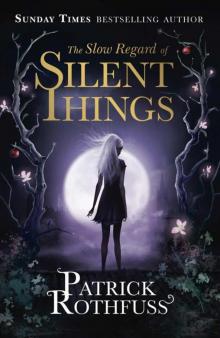 The Slow Regard of Silent Things
The Slow Regard of Silent Things The Name of the Wind
The Name of the Wind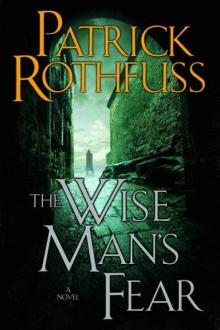 The Wise Man's Fear
The Wise Man's Fear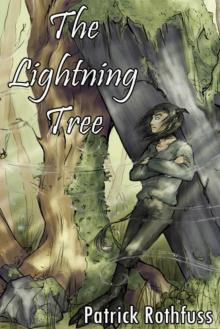 The Lightning Tree
The Lightning Tree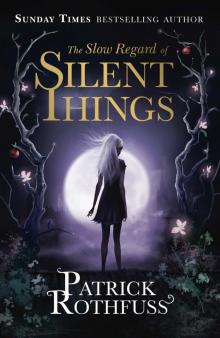 The Slow Regard of Silent Things: A Kingkiller Chronicle Novella (The Kingkiller Chronicle)
The Slow Regard of Silent Things: A Kingkiller Chronicle Novella (The Kingkiller Chronicle)![Kingkiller Chronicle [01] The Name of the Wind Read online](http://i1.bookreadfree.com/i/03/24/kingkiller_chronicle_01_the_name_of_the_wind_preview.jpg) Kingkiller Chronicle [01] The Name of the Wind
Kingkiller Chronicle [01] The Name of the Wind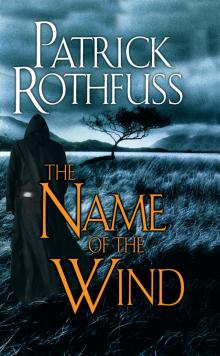 The Name of the Wind tkc-1
The Name of the Wind tkc-1